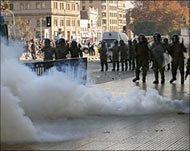Chile stamps on student protest
Chilean riot police have used water cannon and tear gas to disperse students marching and dancing in the streets to protest against bus fares, exam fees and poorly equipped schools.

Dozens of students were arrested in the capital and hundreds of schools closed all over Chile as more than 300,000 students occupied school grounds, calling for improved education in one of South America’s wealthiest countries.
An AP report said up to 600,000 people took part in the protests, which have put pressure on the government to back down from an earlier refusal to negotiate with the students.
Martin Zilic, the education minister, said he would meet student leaders to hear their demands and was “prepared to work on all topics”.
Protests began two weeks ago when students took over a few schools in the capital – sleeping overnight in classrooms and eating food brought in by sympathetic parents.
Law reforms
The movement spread all over the country, Chile’s biggest student uprising in decades and the first major street protests faced by Michelle Bachelet, the new president.
 |
|
Riot policemen used tear gas |
The demands expanded to include reforms of the country’s education law, which was issued by former leader Augusto Pinochet a day before he left office in 1990.
The law assigns responsibility for public education to municipalities, which critics say breeds inequality because of regional differences in resources available.
Javier Romero, a leader of the movement, said: “We want the state to be the only guarantor and administrator of public education. Only that would ensure equality.”
Subsidies
Jose Joaquin Brunner, the former education minister, said Chile’s poorest schools allocate an estimated $73 a month per student, compared with more than $385 at the richest.
 |
|
Bachelet is facing the first street |
The law also allows the virtually uncontrolled creation of private schools that are entitled to government monthly subsidies of $57 a student.
Critics say the schools’ owners are more interested in profiting from the subsidies than providing a high-quality education.
Students now pay the equivalent of $40 to take a college entrance exam and about 20 cents to take a bus.
Protesters say that both should be free, and also complain of a shortage of teachers and schools in disrepair.
“We are protesting on behalf of our school. The bathrooms are disgusting, you can’t even take a shower in the locker room, and they don’t do anything about it,” said Bernardo Ferrada, 15, his nose and eyes burning from tear gas.
Broad support
Ferrada said he and 25 other students from the Arturo Prats high school in the middle class neighbourhood of Puente Alto joined a march headed to the national palace before police sprayed them with tear gas from armoured vehicles.
|
“We want the state to be the only guarantor and administrator of public education. Only that would ensure equality” |
Students in Valparaiso, Concepcion and other Chilean cities also held marches and college students stayed away from classes in sympathy.
Students at elite private schools went to school but held solidarity events on Tuesday instead of classes.
The well-organised student leaders in their grey-and-blue school uniforms have taken over the nightly news and the public agenda in the last two weeks.
Lagging quality
In recent decades, Chile has expanded school coverage to most of the population, but students say quality has lagged.
 |
|
High copper prices have benefited |
“We have not improved the quality of education as we wanted. The big new challenge for us is closing the quality gap,” Pilar Romanguera, the deputy education minister, acknowledged in a recent radio interview.
Students say they should benefit from windfall profits from a rally in prices for copper.
Chile is the biggest copper producer in the world and the government has a massive budget surplus and very low debt due to copper income.
“Copper sky high and education in the gutter,” read a banner at one school.
Students and parents also criticised what they said was heavy-handed police reaction to peaceful marches.
Victor Barrueto, Santiago city administrator, told TVN television that “the police did what they had to do to dissuade the students from marching, so that they don’t interrupt traffic and disturb the peace”.